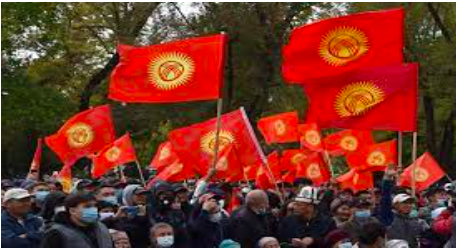Roles India can play in Afghanistan following withdrawal of US troops
Posted on : June 28, 2021Author : Anirban sen

The United States is withdrawing the last of its troops from Afghanistan. For the first time in nearly twenty years Afghanistan would not have any foreign armies on its soil. The US involvement in Afghanistan which began with the 9/11 attacks on New York and Washington DC began with the overthrow of the Taliban regime which had been harbouring the Al Qaeda extremists who were behind the 9/11 attacks. It ends with the US having had signed a deal with the Taliban under the previous Trump administration which among other things stipulate that the Taliban will cut off all links with Al Qaeda to see to it that Afghanistan does not become a centre for global terrorism again.
But this has not actually happened on the ground. The Taliban continue to maintain close ties with Al Qaeda and its affiliates. Another major issue is that while a deal has been signed between the Taliban and the US government no similar deal has been signed between the Afghan government and the Taliban. The Afghan people do not yet know what role the Taliban will play in any future Afghan dispensation. Nobody wants to return to the time when the Taliban imposed harsh Islamic law on the country. Most Afghans especially the women and the religious and ethnic minorities want to protect the rights they have gained since the Taliban were overthrown. These are but one of the few of the many challenges that Afghanistan will continue to face in the coming future. How the country deals with these challenges will determine its future for a long period of time. But the Afghan government and people cannot face these challenges alone. Regional countries need to pitch in and play their part as well. This is where the role of India comes into the picture.
What role should India play in the future in Afghanistan? I shall divide my analysis into four sections, like India and the Afghan government, India and the Afghan people, India and the Taliban, and finally India and other regional countries.
India and the Afghan government
With the final and complete withdrawal of US troops, the Afghan government will lose a key provider of security. Insurgent attacks continue to happen in the capital Kabul as well as in the wider countryside. With no American forces to back up the Afghan government the insurgents will gain confidence and become much bolder. In light of this situation what can India do?
India can never replace the United States as a security provider for Afghanistan. But in this period India can do other things which to have a significant impact. Firstly the Strategic Partnership Agreement which was signed in 2011 should be expanded in scope. India should send in its military personnel to Afghanistan as security advisors. This will not be boots on the ground. These military advisors could assess the situation on the ground in Afghanistan and advise the Afghan government accordingly. With the vast experience of India in counter-terrorism and counter-insurgency, these advisors have to adapt their advice to suit the Afghan situation. Intelligence cooperation between the two countries can also increase. Indian intelligence agents need to increase in Afghanistan and India also need to build up more local Afghan assets. If these few initial basic steps are taken then India could play an important role in security affairs of Afghanistan in the future, and not just been seen as a country which provides development assistance.
India and the Afghan people
India needs to increase its impact upon the Afghan people. Travel restrictions between the two countries need to be removed so that people from both countries can move freely to the other country without any hassles. This will open up India for the Afghan people and vice versa. Thus an agreement stipulating the free movement of people between the two countries needs to be signed. India must also increase its soft power diplomacy amongst the Afghan people. Indian cultural centres should be opened in every major Afghan city and India should provide funding to educate Afghans in various facets of Indian culture. Only through these measures can India compete with countries like China which aggressively carry out soft power diplomacy through its language and cultural policies. All these measures have to be carried out towards all the ethnic and sectarian groups in Afghanistan for them to have a significant effect.
India and the Taliban
India has officially begun talking with the Taliban through various channels. This is a good positive step. However this is not the first time that such talks have been taking place. When the Taliban were in power in the late 1990s India had sent out feelers to the movement. However these steps did not amount to much back then because at the time the Taliban were absolute proxies of the Pakistani security and intelligence services.
But now the situation has changed. The Taliban are looking at their options in Afghanistan. Pakistan does not have the same influence on the movement that it used to before. The Taliban are seeking to gain international legitimacy as they seek to join the Afghan government in one way or another. For this they need recognition by other countries, especially important regional ones like India. This is a golden opportunity for India. If India can somehow wean the Taliban away from Pakistani influence once and for all then this will be a huge strategic victory for the country. Then the security threat in Afghanistan which India currently faces will be significantly reduced and India can expand its presence in Afghanistan in a considerable way. This will not be easy. India might have to sign some kind of a deal with Afghanistan under which might have to provide the movement with some kind of assistance. This will certainly not be the same kind of assistance that the Pakistanis had been giving them in the past. But any price is worth paying to achieve this major strategic goal.
India and other regional countries
Finally it cannot be stressed enough that India has to continue to engage with other countries in the region in dealing with the evolving situation in Afghanistan. India has already worked closely with countries like Iran and Russia when all three were supporting the opposition Northern Alliance when the Taliban were in power. However that relationship cannot be revived. The situation has changed completely now. Each of these three countries now have different strategic interests in Afghanistan. So India needs to expand its engagement with other regional counties which are involved in Afghanistan, like the important Gulf monarchies of Saudi Arabia, UAE and Qatar as well as the various Central Asian states. Only then can India have a significant voice in any future regional dispensation on Afghanistan.
These are but few of the many policy options India has in Afghanistan. If the Indian government can think along these lines instead of the traditional tried and tested ways, then India’s flexibility of operation in Afghanistan will increase significantly. The Afghan people will also benefit in a major way from all these measures. It can thus be concluded that this is a win-win course of action for both sides to pursue.
Anirban Sen
Adjunct Researcher
Asia in Global Affairs




